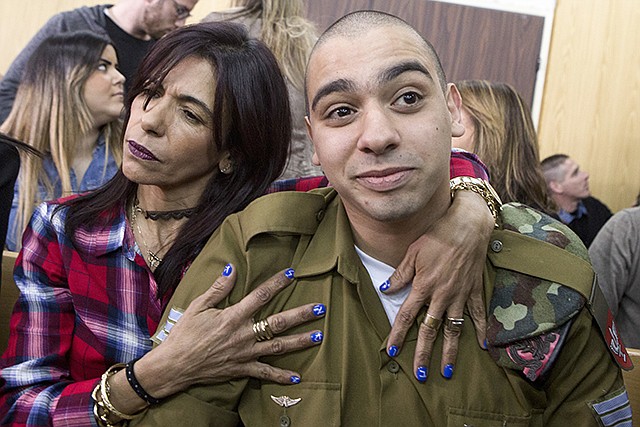JERUSALEM (AP) - An Israeli soldier was sentenced Tuesday to 18 months in prison for killing a badly wounded Palestinian assailant as he lay on the ground, in a landmark decision that deepened fissures in Israeli society and drew Palestinian criticism for being too lenient.
Leading nationalist Israeli politicians called any jail time unfair and urged an immediate pardon, while Palestinians dismissed Israel's justice system as a "joke."
The sentencing of Sgt. Elor Azaria culminated a nearly yearlong saga that has bitterly divided the country. While Israel's top generals pushed for the prosecution of a soldier they say violated the military's code of ethics, large segments of the public, including politicians on Israel's nationalist right, sided with Azaria. Even Prime Minister Benjamin Netanyahu gave only lukewarm support to his military.
Although the sentence was lighter than expected, those divisions showed no signs of easing following Tuesday's sentencing at a Tel Aviv military court. Dozens of people demonstrated outside in support of Azaria, one of them holding a poster that said "Trump would do the same," and hard-line politicians called for his release.
"Even if he erred, Elor should not sit in prison. We will all pay the price," said Education Minister Naftali Bennett, leader of the nationalist Jewish Home Party.
Azaria, an army medic, was recorded on a cellphone video last March as he fatally shot a badly wounded Palestinian who had stabbed a soldier in the West Bank city of Hebron. The Palestinian, Abdel Fattah al-Sharif, was lying on the ground unarmed when Azaria shot him in the head.
Azaria was convicted of manslaughter last month in a rare case of a military court ruling against a combat soldier for lethal action taken in the field.
The verdict marked a victory for commanders who said Azaria had violated army procedures.
However, the soldier enjoyed wide public support. In Israel, military service is compulsory for most Jewish men, and soldiers enjoy widespread sympathy.
A Channel 2 TV poll taken after the conviction found that 67 percent of respondents supported clemency. The poll questioned 666 people and had a margin of error of 4.4 percentage points.
Asa Kasher, a philosopher who wrote the Israeli army's code of ethics, said the case has unleashed dangerous trends in the country.
"One shot by one soldier took on the shape of a war between right and left," he told Channel 2.
He said "extremists" initially took up Azaria's cause, and hard-line politicians followed suit. "Anyone with right-wing sentiments enlisted, and everyone in the end rallied behind a soldier who harmed the values of the Israeli army," he said.
Politicians' support for the soldier fueled the resignation last year of then-Defense Minister Moshe Yaalon, a former military chief of staff.
He was replaced by Avigdor Lieberman, a hard-line politician who had earlier visited Azaria in court during the trial. Lieberman has since toned down his language, and on Tuesday, he urged the public to respect the court's decision.
Netanyahu, who initially defended the military, later softened his position and called Azaria's parents to console them. After last month's verdict, he called for Azaria to be pardoned. Netanyahu was on a trip to Singapore and Australia this week and did not immediately react to the sentencing.
Kasher said a pardon would be devastating for the military.
"It means you can throw commanders' inquiries out the window. You can throw the military court and its decisions out the other window and the racist atmosphere that says you may kill terrorists even if they are neutralized will rule," he said.
President Reuven Rivlin is not expected to consider a pardon until the appeals process is complete.
The shooting took place at the height of an ongoing wave of violence. Since September 2015, Palestinian attackers have carried out numerous stabbing, shooting and car ramming attacks that have killed 41 Israelis and two visiting Americans. During the same time, Israeli forces have killed 235 Palestinians, most of them said to be attackers.
Palestinians and human rights groups have accused Israeli forces of using excessive force and even harming innocent people mistaken for attackers. But before the video of the shooting, taken by a Palestinian human rights activist, it was difficult to prove these claims.
Human rights groups praised the conviction but dismissed Tuesday's sentence as far too lenient. Prosecutors had sought a sentence of three to five years in prison.

